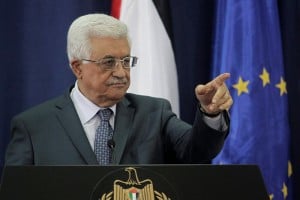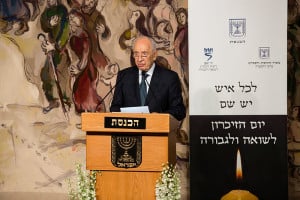A United with Israel exclusive: The author, Dr. Mordechai Kedar, an Israeli scholar of Arabic Literature and a lecturer at Bar-Ilan University, argues that the role of the founder of the Palestinian liberation movement in Holocaust history is conveniently ignored.
Beginning in May 1944, Hungary’s Jews were deported by train to Auschwitz-Birkenau, where they were killed upon arrival. Israeli President Shimon Peres described the destruction of Hungarian Jewry in bone-chilling detail in his speech at the Yad Vashem Holocaust Museum in Jerusalem Sunday night.
A few days before Israelis honored the six million Jews killed by the Nazis and their willing collaborators at a Holocaust memorial event, Palestinian Authority President Mahmoud Abbas met with American Rabbi Marc Schneier, a well-known proponent of interfaith dialogue. It was during this get-together that Abbas declared, “The Shoah was the worst crime in human history.” The “Holocaust was a reflection of a racist ideology as expressed in ethnic cleansing, which the Palestinian people reject,” the PA president added. “Indeed, the Palestinian people, afflicted and oppressed, are the first to demand the end of racism against other nations.”

PA Chairman Mahmoud Abbas (Photo: Issam RImawi/Flash90)
Abbas subtly draws a parallel between the Nazi ‘Final Solution’ and today’s Israel. According to Israel’s presumptive peace partner, Israel is doing unto the Palestinians what the Nazis inflicted upon the Jews.
Is that so? Is Israel herding Palestinians onto trains like animals? Is Israel shoving the Palestinian people into gas chambers? Is Israel burning Palestinian bodies in crematoria? Is Israel capturing Palestinians and confining them in forced labor camps?
Yet, despite the fact there is zero similarity between what is happening now west of the Jordan River and the horrors experienced 70 years ago in Europe, Abu Mazen (Abbas) does not hesitate to implicitly equate Israel to Nazi Germany.
Grand Mufti: Founder of Palestinian Liberation, Nazi Collaborator
As disturbing as Abbas’s statements are, it’s what he does not say that is morally repugnant. Let’s not forget that the annihilation of Hungary’s Jews was aided by the founder of the Palestinian national liberation movement, the Mufti of Jerusalem, Haj Amin al-Husseini.
Having fled to Berlin in 1941, the Mufti got busy, actively assisting the Nazis by recruiting Bosnian Muslim soldiers into the Wafen-SS. It was these Mufti recruits who guarded the bridges across which passed the trains that carried over half a million Hungarian Jewish men, women and children to Auschwitz for extermination. The Muslim soldiers were tasked with thwarting partisan efforts to slow the killing machine by blowing up vital arteries such as bridges.
The Mufti also helped establish the “Free Arab Legion” that operated as an adjunct to the Wehrmacht, the German army. The Nazis were most appreciative, paying al-Husseini a monthly salary that was twice the amount of a Reich Field Marshall’s.
Al-Husseini’s activities on behalf of Nazi Germany are explored in a documentary titled “The Turban and the Swastika”.
At this point, allow me to relay a relevant personal experience. Several years ago I participated in a discussion about the Israeli-Palestinian peace talks conducted on an Arabic media outlet. The segment featured a spokesman from the Palestinian Authority. When I brought up the Mufti’s active involvement in the annihilation of Europe’s Jews, the PA representative claimed al-Husseini’s participation was justified, since now these Jews could “not come to Palestine.” I responded by asking, “What if they were planning on coming to America? Would they then also have deserved a death sentence?” He did not answer my question.
Arab media never talk about the role of the Palestinian Mufti in the extermination of Hungary’s Jews. Yesterday, on the eve of Holocaust Memorial Day, I was interviewed in Arabic by the BBC about Abbas’s statement that the Holocaust was, “…the worst crime in human history.” During the interview, I criticized Abbas for not condemning the Palestinian Mufti’s complicity in that horrible crime. Though the interview was broadcast, the part about Haj Amin al-Husseini was cut.
I would like to ask Rabbi Marc Schneier: After Mahmoud Abbas condemned the destruction of European Jewry, did you remind him about the role of the Palestinian Mufti in facilitating the Nazi death machine? Does President Abbas find these actions reprehensible?
Apparently, selective memory is what’s required for an orthodox rabbi to conduct an interfaith dialogue with Israel’s enemies.
Selective Memory: Holocaust History Revised
Israel’s government, especially during Holocaust Memorial Day, must remind the country’s citizens and neighbors what Palestinian leaders did to destroy us. However, there is a tendency to forget recent history. During his speech that opened the official Holocaust Memorial Day commemoration, Israeli President Shimon Peres dedicated several minutes to describing in gruesome detail the destruction of Hungarian Jewry that occurred 70 years ago.
Evidently, the President of Israel ‘forgot’ to mention the involvement of the Palestinian Mufti in this crime against humanity.

President Shimon Peres attends a Holocaust ceremony at the Knesset in Jerusalem on Monday. (Photo: Yonatan Sindel/Flash 90)
Omitting the role of the Mufti from his nationally televised address was no accident: Peres believes that the Palestinians are partners in peace, so why remind them and us about the terrible crime committed by their leader against our people?
Day and night for generations we have proclaimed that the Holocaust must never be forgotten, that its horrors and lessons will forever be emblazoned on the collective human conscience.
But how can we continue to demand from the world that it continue to remember the Holocaust if the President of Israel “forgets” to note a significant aspect of the Shoah just because he doesn’t want to embarrass his friend, Mahmoud Abbas, by mentioning a Palestinian leader’s involvement in the extermination of Jews?
It turns out that selective memory is not just employed by our enemies: the President of Israel’s Holocaust memories are also selective, shaped by a personal and political agenda.
Translated from Hebrew by Gidon Ben-Zvi, Contributor, United with Israel